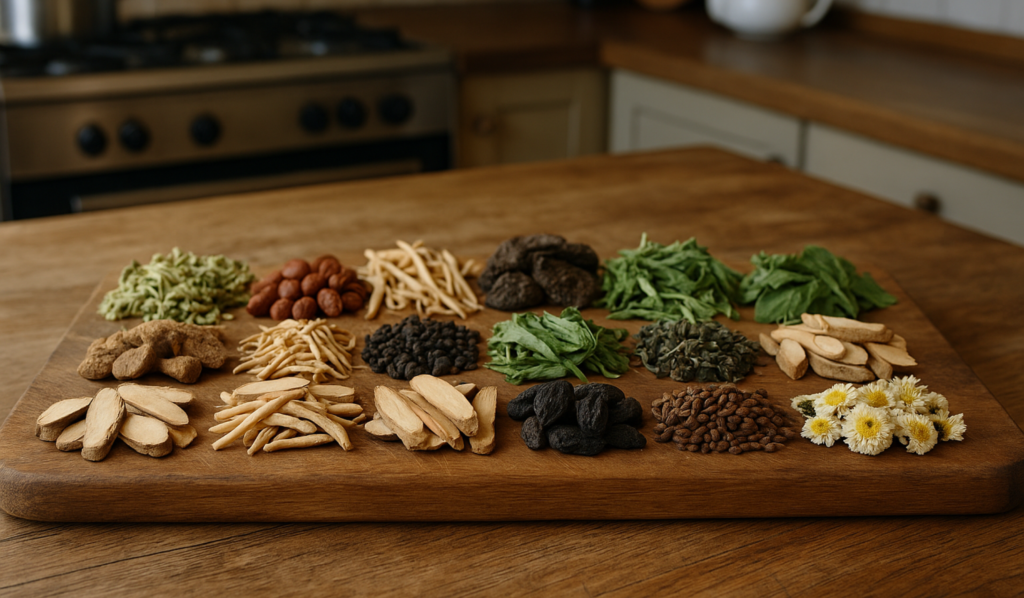Chinese Medicine for Sore Throat: Natural Remedies for Lasting Relief
When your throat starts to burn, tighten, or feel raw, even swallowing water can become a challenge. For many, sore throat relief begins with store-bought lozenges or sprays. But what if the discomfort keeps returning, or the symptoms linger longer than expected? These recurring issues often point to something deeper. Traditional Chinese Medicine offers a more holistic way forward, supporting the body’s healing process through herbal medicine, acupuncture, and time-tested practices that focus on restoring internal balance instead of just numbing the pain.
In Chinese medicine, a sore throat is never viewed in isolation. It is often seen as a sign that the body is fighting off a pathogenic invasion or dealing with internal heat or dryness. Unlike conventional medicine that focuses on suppressing symptoms, TCM practitioners identify the root pattern behind the irritation—whether it’s Wind-Heat, Yin Deficiency, or Fire Toxin—and use customized herbal formulas and other natural treatment methods to bring the body back into harmony. For those seeking natural sore throat relief without relying on medication, Chinese medicine offers both immediate comfort and deeper healing.
Chinese Medicine for Sore Throat: Natural Remedies for Lasting Relief

When your throat starts to burn, tighten, or feel raw, even swallowing water can become a challenge. For many, sore throat relief begins with store-bought lozenges or sprays. But what if the discomfort keeps returning, or the symptoms linger longer than expected? These recurring issues often point to something deeper. Traditional Chinese Medicine offers a more holistic way forward, supporting the body’s healing process through herbal medicine, acupuncture, and time-tested practices that focus on restoring internal balance instead of just numbing the pain.
In Chinese medicine, a sore throat is never viewed in isolation. It is often seen as a sign that the body is fighting off a pathogenic invasion or dealing with internal heat or dryness. Unlike conventional medicine that focuses on suppressing symptoms, TCM practitioners identify the root pattern behind the irritation—whether it’s Wind-Heat, Yin Deficiency, or Fire Toxin—and use customized herbal formulas and other natural treatment methods to bring the body back into harmony. For those seeking natural sore throat relief without relying on medication, Chinese medicine offers both immediate comfort and deeper healing.
Key Takeaways
- Chinese herbs for sore throat focus on treating both symptoms and root causes, such as Wind-Heat, internal Heat, and Yin Deficiency, using remedies like Lonicera Flower (Jin Yin Hua) and Forsythia Fruit (Lian Qiao) to clear toxins, reduce inflammation, and promote healing.
- Herbs like Scrophularia Root (Xuan Shen) and Platycodon Root (Jie Geng) nourish the throat’s Yin, providing relief from dryness, hoarseness, and chronic irritation.
- Acupuncture plays a crucial role in easing throat pain, targeting points that relieve swelling and tension, while enhancing overall immune function and circulation to support long-term recovery.
- Moxibustion and cupping therapy complement herbal treatments by improving circulation and resolving stagnation, helping to clear toxins and strengthen the body’s defense against recurring throat issues.
- Personalized treatment is key in TCM, as each sore throat case is addressed based on its underlying pattern, offering a holistic solution that goes beyond temporary relief.
Common Chinese Herbal Remedies for Sore Throat
Traditional Chinese Medicine uses a wide range of herbs to treat sore throat, each selected based on the individual’s unique imbalance. These herbs work by clearing pathogenic heat, nourishing Yin, resolving toxicity, and soothing inflammation. Unlike conventional throat sprays or lozenges, TCM herbal formulas aim to restore internal balance and prevent recurrence.
Below are 15 commonly used Chinese herbs and formulas for sore throat relief, chosen for their ability to address different root patterns:
1. Lonicera Flower (Jin Yin Hua)
Jin Yin Hua is a cooling and detoxifying herb widely used for the early onset of sore throat, especially when symptoms include fever, red tongue, and mild body chills. In TCM, it’s part of the “clear heat and relieve toxicity” category and is commonly included in formulas for Wind-Heat invasion. Its antibacterial and antiviral effects make it valuable during the first few days of a cold or flu when inflammation and infection are most active.
2. Forsythia Fruit (Lian Qiao)
Often used in tandem with Jin Yin Hua, Lian Qiao is another heat-clearing herb that helps prevent the progression of an upper respiratory infection. It disperses clumps of heat and toxins, which TCM refers to as “Fire Toxin” accumulation. With a slightly bitter and cooling nature, it helps relieve red, swollen throats and may reduce pus formation in more advanced stages of sore throat.
3. Platycodon Root (Jie Geng)
Jie Geng is a versatile herb known for its unique function of guiding other herbs upward to the throat and lungs. In formulas, it acts as a “messenger” to ensure effective delivery of therapeutic actions to the respiratory tract. Jie Geng also disperses Lung Qi, making it suitable for sore throats accompanied by cough, sticky phlegm, or a feeling of fullness in the chest.
4. Scrophularia Root (Xuan Shen)
Deeply nourishing and cooling, Xuan Shen is essential in cases where throat pain stems from Yin Deficiency, a pattern marked by dryness, chronic inflammation, or hoarseness that worsens in the evening. It moistens the throat, cools the blood, and reduces lymphatic swelling. It’s particularly effective in long-standing throat discomfort or post-viral irritation that doesn’t respond to antibiotics.
5. Isatis Root (Ban Lan Gen)
This powerful detox herb is commonly used during epidemics or flu seasons. It’s known for its potent antiviral and antibacterial properties. In TCM, it clears Heat and resolves Fire Toxins. Ban Lan Gen is often taken as a tea or granule when there is an acute sore throat with signs of systemic infection, such as swollen lymph nodes or tonsillitis.
6. Andrographis (Chuan Xin Lian)
Bitter and cold, Chuan Xin Lian is ideal for high-fever sore throats, especially when pus, red throat, and a strong aversion to swallowing are present. It’s used in TCM for Fire Toxin and Damp-Heat patterns, often in more severe cases of throat infection. Its modern pharmacology supports its use as an immune-boosting and antimicrobial herb.
7. Licorice Root (Gan Cao)
Gan Cao is a harmonizing herb found in countless Chinese formulas. It is sweet, tonifying, and has a mild cooling nature. In sore throat formulas, it soothes irritated mucous membranes, relieves pain, and acts as a natural anti-inflammatory. Gan Cao is also used to moderate the harshness of stronger herbs, making formulas more tolerable.
8. Rehmannia Root (Sheng Di Huang)
Used for internal heat and Yin Deficiency, Sheng Di Huang cools the blood and generates fluids. It’s suited for dry, scratchy throats with a red tongue and little or no coating—signs of heat damaging the Yin. It also helps support the immune system in chronic cases or those worsened by overwork and dehydration.
9. Ophiopogon Root (Mai Men Dong)
This herb gently nourishes Lung and Stomach Yin, helping to ease a sore, dry throat linked to exhaustion, late nights, or chronic illness. In TCM, the Lung governs the throat, and when its Yin is depleted, the throat becomes dry and inflamed. Mai Men Dong moistens the tissues and is often used for lingering throat irritation after colds or flu.
10. Baikal Skullcap Root (Huang Qin)
Bitter and cold, Huang Qin targets Heat in the upper body, particularly the Lungs. It’s used when sore throat is accompanied by symptoms like dry mouth, bitter taste, red eyes, and irritability—signs of excess Heat in the Liver or Gallbladder. It also has notable anti-inflammatory and antimicrobial properties, making it useful in moderate infections.
11. Belamcanda Root (She Gan)
She Gan is used specifically for phlegm-heat in the throat, often when the sore throat is accompanied by hoarseness, sticky sputum, or swollen tonsils. It is strong in its clearing action and is often included in formulas for acute laryngitis or chronic pharyngitis. It’s particularly helpful for professional voice users with recurring throat issues.
12. Chrysanthemum Flower (Ju Hua)
Known for its ability to clear wind and heat, Ju Hua is ideal for sore throats that occur alongside eye irritation, headache, and sensitivity to wind. It has a cooling effect on the upper respiratory tract and is gentle enough for daily use in teas during allergy or flu season.
13. Burdock Fruit (Niu Bang Zi)
Spicy, bitter, and cold, Niu Bang Zi disperses Wind-Heat and benefits the throat. It’s one of the best herbs for swollen, painful sore throats where the tonsils or lymph nodes are visibly inflamed. It also helps resolve skin eruptions, making it a valuable herb for sore throat accompanied by rashes.
14. Dandelion (Pu Gong Ying)
Pu Gong Ying clears Heat and resolves toxicity, often used when infection is suspected. It also supports Liver function and detoxification, helping to reduce heat that may manifest in the throat. It is cooling, slightly bitter, and can be made into tea to support early immune response.
15. Anemarrhena Rhizome (Zhi Mu)
Zhi Mu is a Yin-nourishing and heat-clearing herb used when there’s Empty Heat—feeling hot despite having low energy or dryness. It’s useful for throat pain that worsens with talking or dry air, particularly when caused by hormonal imbalances, overwork, or night sweats.
These herbs are typically combined into customized formulas based on an individual’s constitution and diagnosis. Consulting a licensed practitioner ensures that the herbs are properly balanced to address not just your sore throat, but the underlying imbalance contributing to it.
At ACA Acupuncture and Wellness, we take a personalized approach to every treatment plan. Our licensed practitioners assess your unique symptoms, tongue and pulse presentation, and overall health history to recommend herbal formulas that not only relieve sore throat discomfort but also support long-term healing and immune resilience. By addressing the root cause—not just the surface symptoms—we help your body return to a state of balance and vitality.
How Traditional Chinese Medicine Understands a Sore Throat
In Traditional Chinese Medicine (TCM), every symptom is part of a larger picture. A sore throat may seem minor, but it can reveal how external pathogens or internal imbalances are affecting the body’s natural defenses. TCM doesn’t label sore throats generically—it distinguishes between several types, such as Wind-Heat invasion, Yin Deficiency with Empty Heat, and Lung or Stomach Heat.
For example, Wind-Heat is associated with sudden sore throat, fever, mild chills, and possibly a thin yellow coating on the tongue. This pattern typically aligns with the early stages of a cold or flu. On the other hand, Yin Deficiency might cause a persistent, dry, or burning throat that worsens at night. In this case, the issue stems from internal dryness and depletion of fluids, often linked to chronic stress, overwork, or lack of sleep.
Each diagnosis shapes the course of treatment. The goal is not only to soothe the sore throat but to address the root cause and rebalance the body. This is what makes Chinese medicine both targeted and holistic.
Causes and Risk Factors of Sore Throat in Chinese Medicine
In both Western and Chinese medicine, a sore throat can be caused by infections, irritants, or environmental factors. But Traditional Chinese Medicine goes further—identifying not only the external triggers but also the internal imbalances that make the throat vulnerable in the first place.
Common Causes of Sore Throat in TCM:
External Pathogens (Wind, Heat, Cold, Dryness)
- Sudden weather changes or exposure to cold wind can allow pathogenic factors to enter the body and lodge in the throat.
- Wind-Heat is the most frequent cause, especially during flu season.
- Dry climates or indoor heating can aggravate the throat by consuming Yin and fluids.
Internal Heat or Fire
- Excessive internal heat from the Lung, Stomach, or Liver can rise upward and irritate the throat.
- This is often associated with high stress, spicy diets, alcohol, or hormonal changes.
Yin Deficiency
- When the body’s nourishing fluids are depleted, the throat becomes dry, inflamed, or chronically irritated.
- Common in those who are overworked, sleep-deprived, or recovering from illness.
Phlegm-Heat or Damp Accumulation
- Unresolved dampness from diet or digestion may congeal into phlegm and settle in the throat.
- This creates a coated sensation, congestion, or post-nasal drip that irritates the tissues.
Digestive Disharmony
- Poor digestion affects the Lung and Spleen systems, weakening the immune response and allowing repeated throat inflammation.
- Acid reflux or bloating may accompany chronic throat irritation.
Risk Factors That Increase Sore Throat Recurrence:
Overuse of the Voice
- Teachers, singers, public speakers, and customer service workers are more prone to vocal strain.
- Talking loudly or for long periods dries out the throat and can lead to inflammation.
Poor Air Quality
- Exposure to cigarette smoke, pollution, dry indoor air, or allergens can inflame the respiratory tract.
- Long-term exposure weakens the Lung Qi, making the throat more sensitive.
Dietary Triggers
- Spicy, fried, or overly greasy foods generate internal heat and phlegm.
- Cold drinks and raw foods may weaken digestion and disrupt the Spleen’s function.
Chronic Stress or Fatigue
- Emotional tension depletes Yin and weakens Wei Qi (defensive energy), allowing pathogens to linger or re-enter.
- This explains why sore throats often appear during burnout or emotional overwhelm.
Weakened Immune System
- Individuals recovering from illness or those with chronic deficiencies are more susceptible to recurring throat infections.
- TCM focuses on strengthening foundational systems rather than just fighting off symptoms.
By understanding these root causes and risk factors, treatment can shift from temporary relief to lasting recovery. Instead of suppressing symptoms, TCM works to rebuild resilience and reduce your throat’s sensitivity to triggers.
TCM-Based Tips to Prevent Sore Throat Before It Starts
Preventing sore throat in Traditional Chinese Medicine isn’t about avoiding germs alone—it’s about supporting the body’s internal systems so it’s less reactive to triggers. Daily habits that strengthen Wei Qi (defensive energy) and nourish Yin can help prevent frequent inflammation.
Daily practices to help prevent sore throats:
| Practice | Why It Matters in TCM |
| Protect your neck and throat | Wind is considered the “carrier of 100 diseases” in TCM. Keeping your neck covered in cold or windy environments helps prevent external invasion. |
| Drink warm, soothing fluids | Warm water with Asian pear, goji berries, or chrysanthemum moistens the throat and nourishes Lung Yin, preventing dryness and inflammation. |
| Avoid overuse of your voice | Excessive talking or whispering can dry out and irritate the throat. Resting the voice helps preserve Qi and avoid strain on the Lung system. |
| Eat according to your constitution | Raw, cold foods weaken digestion (Spleen Qi), while spicy or greasy foods generate internal Heat. Adjusting your diet keeps the body in balance. |
| Manage stress and sleep | Emotional stress and fatigue deplete Yin and weaken Wei Qi (defense energy), making the body more susceptible to Wind-Heat invasion and recurring throat pain. |
| Use herbal teas preventively | Seasonal use of immunity-supporting teas like Yu Ping Feng San helps strengthen Wei Qi and protect against environmental pathogens. |
By integrating small daily rituals with TCM wisdom, many people find that sore throats become less frequent and far less intense.
What Research Says About Chinese Medicine for Sore Throat
In clinical settings, Chinese herbal medicine is commonly used to treat sore throat in China and is now practiced worldwide by Traditional Chinese Medicine (TCM) practitioners. These herbal remedies aim to relieve inflammation, clear pathogenic heat, and support the immune system. Patients experiencing sore throat symptoms frequently report reduced discomfort, easier swallowing, and faster recovery when treated with customized herbal combinations tailored to their specific pattern. Commonly used herbs such as Lonicera (Jin Yin Hua), Forsythia (Lian Qiao), and Andrographis (Chuan Xin Lian) are recognized in both traditional and modern contexts for their ability to support the body’s natural healing process.
Acupuncture is also widely utilized to alleviate throat pain, especially when swelling, tension, or inflammation are present. Practitioners target points that not only provide local relief, but also support overall immune resilience and circulation. Many people find that combining acupuncture with herbal therapy offers a more complete and sustainable solution than symptom-based over-the-counter treatments alone.
While TCM takes a different approach than conventional medicine, its methods continue to demonstrate promising outcomes, especially when applied early and appropriately. As interest in integrative care grows, more patients are turning to Chinese medicine for safe, natural, and personalized relief from recurring sore throat and other upper respiratory issues.
When to Seek Professional Support
Not every sore throat requires medical intervention, but in TCM, even mild symptoms—especially during the cold season—are seen as early warning signs and an opportunity to restore balance before deeper issues arise. As colder weather increases the risk of respiratory infections, it becomes even more important to support the immune system and address throat discomfort promptly.
Persistent, severe, or recurring throat pain may indicate an underlying deficiency or a need for stronger detoxification support. A qualified TCM practitioner will assess not just the throat but also your overall health pattern. This includes checking your tongue, pulse, sleep quality, digestion, emotional health, and exposure to pathogens. From there, they develop a treatment plan that may combine acupuncture, herbs, cupping, and lifestyle coaching.
At ACA Acupuncture and Wellness, our practitioners treat sore throats through personalized, compassionate care. We use traditional diagnostic methods alongside modern understanding to create a path to healing that aligns with your body’s needs.
Sources:
Huang, Y., Wu, T., Zeng, L., & Li, S. (2012). Chinese medicinal herbs for sore throat. Cochrane Database of Systematic Reviews, 2012(3), CD004877
Frequently Asked Questions
How long does it take for Chinese herbal remedies to relieve sore throat?
The duration of relief depends on the severity of the condition and your overall constitution. Acute sore throats caused by Wind-Heat may improve within 1 to 3 days when addressed early with the appropriate herbs. Chronic or recurring cases—such as those rooted in Yin Deficiency or internal Heat—may take longer, often requiring a longer-term approach that supports internal balance and immune resilience.
Is acupuncture safe for children with a sore throat?
Yes, acupuncture is generally safe for children when performed by a licensed provider experienced in pediatric care. For those sensitive to needles, gentle alternatives such as acupressure, massage, or laser acupuncture may be used. These methods help reduce inflammation, ease discomfort, and support the immune system without causing distress.
Are there any side effects of using Chinese herbs for throat infections?
Side effects are rare when herbs are used appropriately based on an accurate diagnosis. However, self-medicating or relying on generic remedies without proper guidance may lead to digestive discomfort or other imbalances. Our licensed practitioners at ACA Acupuncture and Wellness are trained to assess the full picture of your health, using a holistic understanding of Traditional Chinese Medicine to support safe and effective care.
What dietary changes does TCM recommend during a sore throat episode?
During a sore throat episode, TCM recommends warm, soft, and easy-to-digest foods such as porridge, broths, and steamed vegetables. It’s best to avoid spicy, fried, greasy, and overly sweet foods, which can increase internal Heat or phlegm. Cold and raw foods may also slow digestion. Warm teas with ingredients like chrysanthemum, goji berries, or Asian pear can offer additional throat support and hydration.
How often should I take TCM herbal formulas for prevention?
Preventive formulas are typically used during seasonal transitions or times of high stress. They may be taken daily for short periods depending on your constitution and risk factors. Our licensed practitioners at ACA Acupuncture and Wellness can assess your overall pattern and provide guidance on the safest and most effective approach tailored to your needs.
Can I use TCM for chronic sore throat from allergies?
Yes, TCM can be effective for sore throats linked to allergies. Treatment often focuses on strengthening Lung Qi, resolving phlegm, and supporting the body’s defense system. Over time, this approach can help reduce allergic sensitivity and throat irritation, especially when combined with dietary adjustments and other supportive therapies.
Contact ACA Acupuncture & Wellness
Get in Touch
Newsletter Sign Up
LOCATIONS
MANHATTAN
QUEENS
NEW JERSEY
CALIFORNIA

ACA Franchise Opportunities
The over $4 billion US acupuncture market offers a great opportunity with over 10% annual growth rates and a continuing flow of new patients interested in the benefits of acupuncture.






